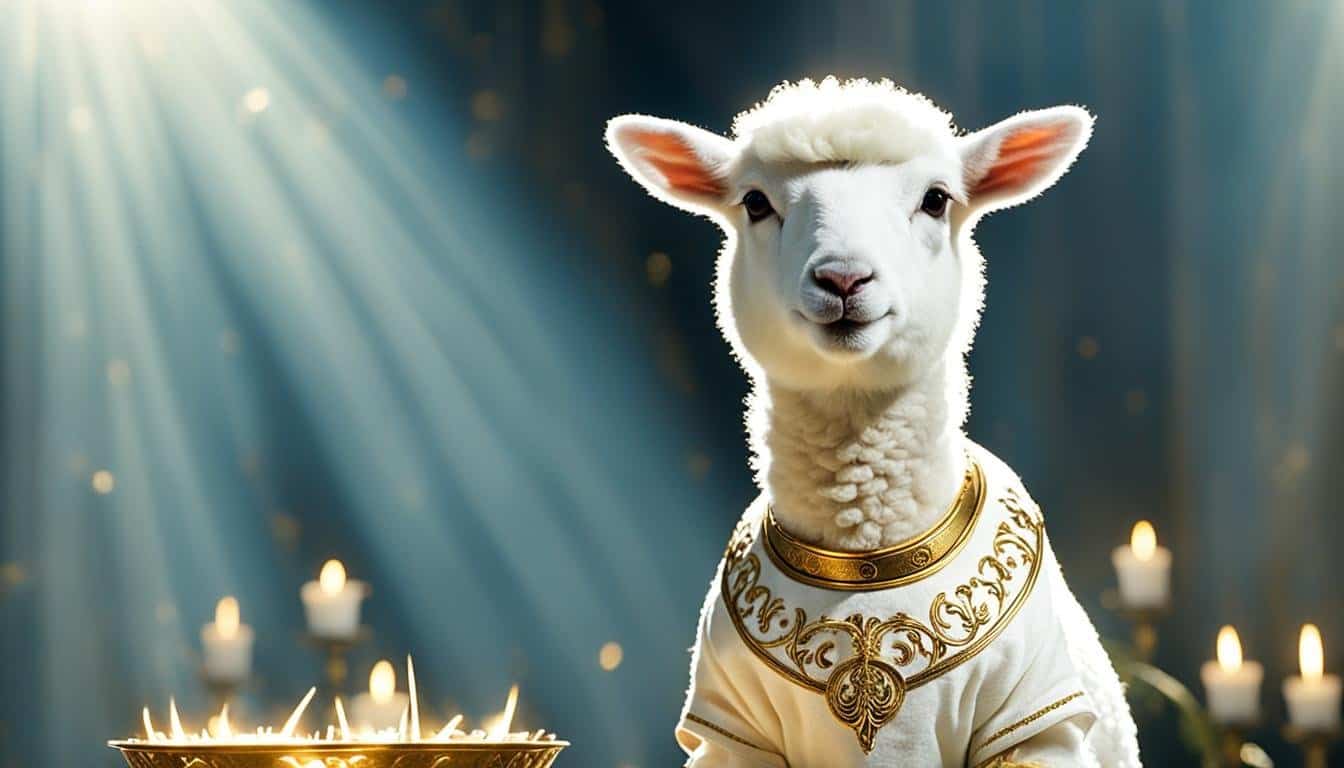Have we ever thought about why the “Lamb Without Blemish” is so important in the Bible? This symbol comes from ancient times and touches on spiritual redemption and worship. It helps us understand its big impact on our faith today.
In the Old and New Testaments, we find key references to the Lamb Without Blemish. For example, in 1 Peter 1:19, Christ is called the unblemished lamb. This shows he was the perfect sacrifice, saving all of us. These passages show us how the lamb is not just about being pure and perfect. It’s also a key part of our worship for centuries.
Looking deeper into the Lamb Without Blemish, we see its roles in the Passover and sacrifices. We also see its link to Christ. This symbol has many meanings that shape our faith and worship.
Key Takeaways
- The Lamb Without Blemish represents purity and spiritual redemption.
- It plays a crucial role in the Passover story, symbolizing God’s protection.
- This symbol is deeply woven into worship practices in both the Old and New Testaments.
- Christ is depicted as the ultimate Lamb Without Blemish, fulfilling sacrificial requirements.
- The significance of the lamb continues to impact modern Christian beliefs and traditions.
- Exploring the Lamb’s role helps us understand the foundations of atonement in Christianity.
Introduction to the Unblemished Lamb
The unblemished lamb is very important in biblical teachings. It comes from ancient sacrifices mentioned in the Bible. It stands for purity and perfection, and helps us understand how to be forgiven and redeemed.
The unblemished lamb has deep biblical symbolism. These animals had to be perfect, without any flaws. This shows us a lot about sin and God’s favor.
The idea of the unblemished lamb has shaped many religious discussions. It reminds us of sacrifices that made us pure again. Thinking about the unblemished lamb makes us think about faith, devotion, and being saved. For more information, check out this insightful article on its importance today.
The Passover Lamb: A Key Symbol
The Passover lamb is a key symbol in the story of deliverance from the Bible. It shows the importance of being pure and making sacrifices, as seen in the scriptures.
Exodus 12:5 Interpretation
In Exodus 12:5, it says the lamb must be perfect, without any flaws. This shows it was chosen for a special task. The lamb’s purity connects it to the story of salvation in Exodus.
Blood as a Protective Token (Exodus 12:13)
Looking closer at Exodus 12:13, we see the blood’s role as a shield. Marking doors with the lamb’s blood meant protection from judgment. The lamb stands for safety, showing the danger and hope of being saved through following God’s commands.
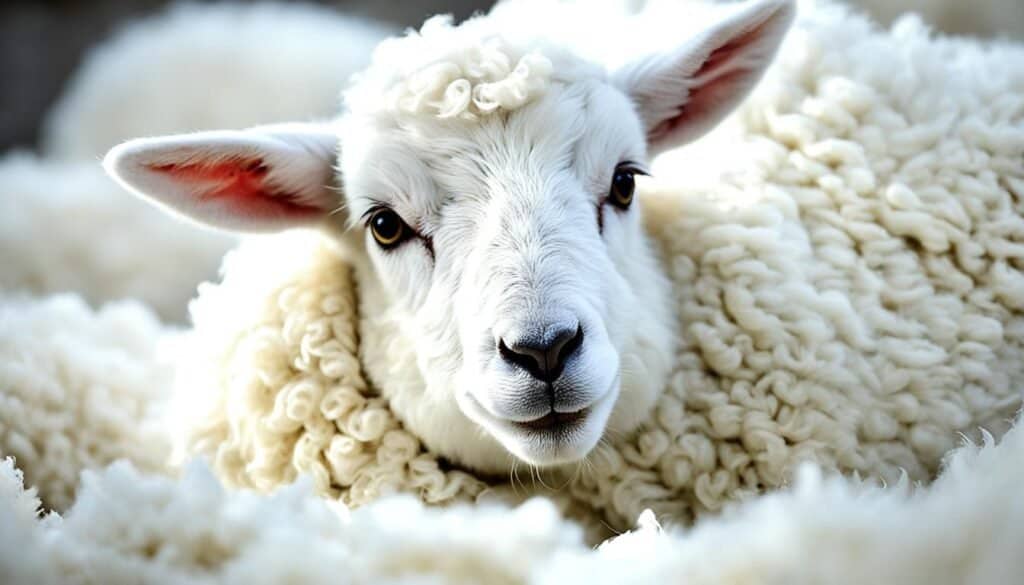
The Lamb as a Symbol of Purity and Perfection
The lamb symbolizes purity and perfection in the Bible. It shows us what it means to be without flaws. Understanding Leviticus 22:21 helps us see the spiritual meaning behind this.
Leviticus 22:21 Explained
Leviticus 22:21 says any offering to God must be perfect. This shows the lamb’s purity and perfection. Animals offered must be flawless, showing our best to honor God.
This rule was more than a ritual. It taught us about true worship.
The Importance of Spotlessness
Being spotless means our hearts and spirits must be clean too. By offering the best, we show we value spiritual cleanliness. The lamb teaches us to aim for integrity and holiness.
This idea challenges us to think about how we act towards God and others.
| Aspect | Description |
|---|---|
| Physical Purity | Animals offered must be without blemish or defect, symbolizing dedication. |
| Spiritual Symbolism | Represents the need for inner cleanliness and integrity in worship. |
| Divine Acceptance | Only pure offerings are deemed acceptable, highlighting God’s standards. |
| Life Application | Encourages believers to pursue holiness in their everyday lives. |
The Sacrificial System and the Role of the Lamb
The ancient Israelites’ sacrificial system is key to understanding atonement and redemption. The lamb is a central figure, symbolizing sacrifice for sin. Leviticus 4:32 explains how to offer a lamb as a sin offering, showing its importance in atonement.
Leviticus 4:32 Overview
Leviticus 4:32 says that a lamb for a sin offering must be perfect. This shows the lamb’s vital role in the system. The act of offering the lamb was a powerful reminder of sin’s cost and the way to be restored.
From Sacrifice to Atonement
The shift from the old sacrificial system to a deeper understanding of atonement highlights the lamb’s role. Sacrifice was not just for atonement but also for a spiritual connection with the divine. Each lamb was a symbol of innocence and purity, showing a merciful Creator’s desire for reconciliation with His creation. This imagery still resonates with us today, connecting to our thoughts on sacrifice and redemption.
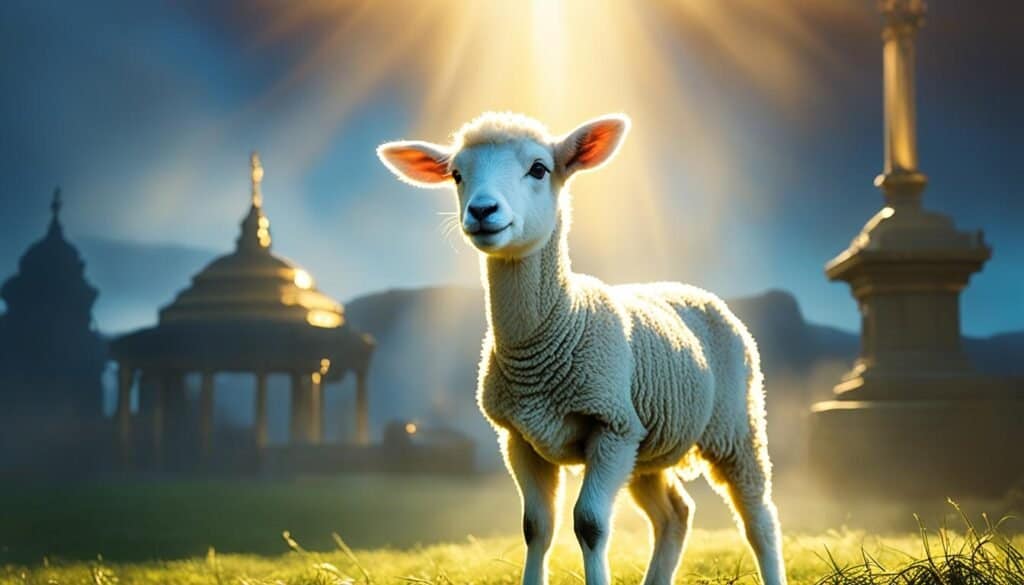
| Aspect | Description |
|---|---|
| Sacrificial System | A means to atone for sins through offerings |
| Leviticus 4:32 | Instructions for offering a lamb for sin |
| Role of the Lamb | Represents purity and is essential for atonement |
| Symbolism | Connection between humanity and divine reconciliation |
Lamb Without Blemish: A Prophetic Significance
In our journey into the unblemished lamb’s meaning, we see its deep roots in the Old Testament. These texts guide us to understand its role in our faith. Isaiah 53:7 stands out, showing the coming Messiah as a sacrificial lamb. It highlights purity and suffering.
The unblemished lamb is more than a historical or ritual figure. It points to something greater. In the New Testament, especially in Revelation 5:6, we see the slain Lamb again. This image strengthens the link between the lamb’s significance and messianic hopes in the scriptures.
Exploring these themes, we see the lamb as a bridge between the Old and New Testaments. It shows God’s plan for redemption. This understanding helps us see how the lamb’s significance fits with our view of God’s purpose and grace.
For a deeper look at divine readiness, we might look at the connection to garments of grace here.
| Aspect | Old Testament Prophecies | New Testament Fulfillments |
|---|---|---|
| Symbolism | Unblemished lamb as a sacrifice | Jesus as the perfect lamb of God |
| Purity | Requirements for the Passover lamb | Jesus’ sinlessness |
| Suffering | Messiah as the suffering servant (Isaiah) | Jesus’ crucifixion and atonement |
| Redemption | Prophesied deliverance for Israel | Salvation offered to all humanity |
The Lamb in the Tabernacle and Temple Worship
In our journey into the tabernacle, we see how the lamb was key in daily offerings and sacrifices. These rituals were crucial for the spiritual life of the Israelites. They created a deep bond between God and His people.
Daily Offerings and Their Importance
Numbers 28:9 talks about the daily offerings. Every morning and evening, perfect lambs were given to atone for sins. This kept the Israelites in good standing with God. It showed their *commitment* to their community.
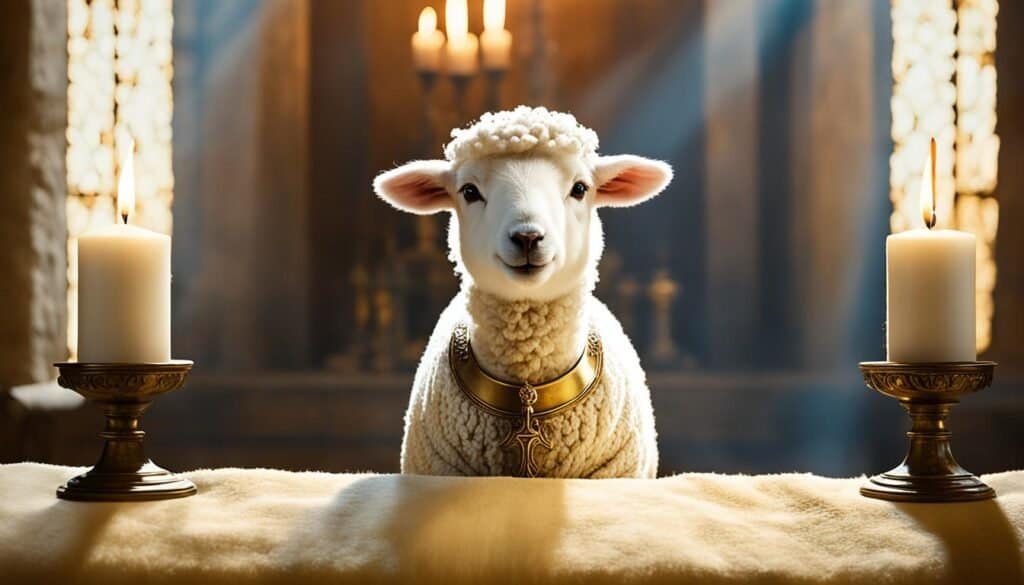
These rituals taught us about the value of daily offerings. They were not just sacrifices but ways to invite God into the community. Worship was a team effort, showing we’re all part of a bigger group. Each lamb stood for purity, adding to the worship in the tabernacle and temple.
Offering lambs in temple sacrifices showed the need for a constant connection with God. To learn more about how these acts shaped Israel’s faith, check out this resource. Understanding these offerings helps us value their role in temple worship.
References to the Lamb in the New Testament
In the New Testament, we see a deep change in how we view sacrifice and redemption. These references tie back to the Old Testament’s sacrificial lamb. They also show Christ’s full role in saving us.
1 Peter 1:19 Context
In 1 Peter 1:19, Jesus is called the “lamb without blemish or spot.” This verse links Jesus’ death to the Old Testament’s purity standards. Being without blemish shows the need for a perfect sacrifice. Early Christians saw Christ as the ultimate sacrifice, deepening our grasp of His saving work.
John 1:29: The Announcement of Jesus
In John 1:29, Jesus is introduced as “the Lamb of God who takes away the sin of the world.” This title underlines His mission to save humanity. By linking Jesus to the Old Testament’s sacrifices, John shows His unique role. This statement is an invitation to see how His sacrifice changes our bond with God.
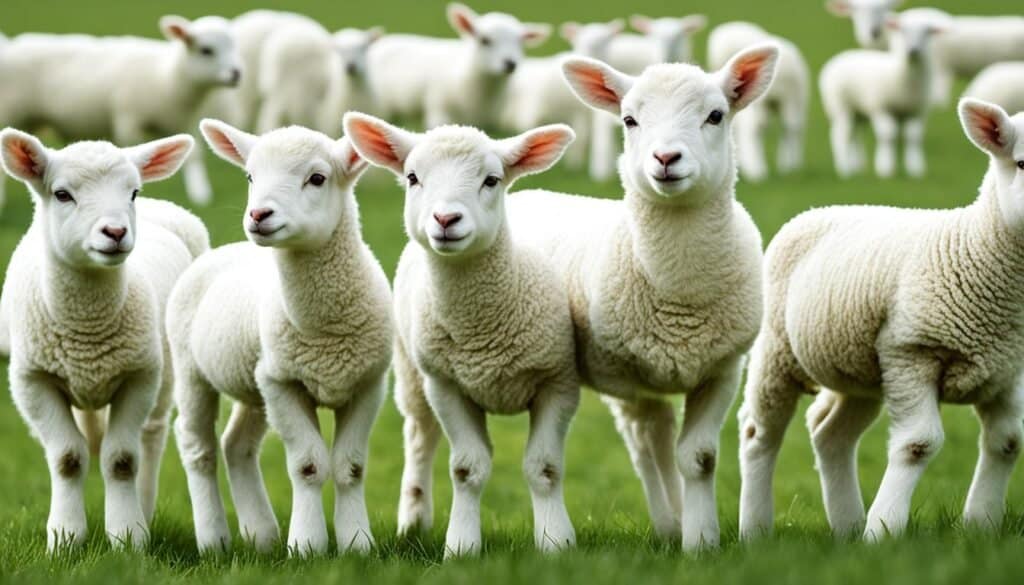
| Scripture | Reference | Key Concept |
|---|---|---|
| 1 Peter 1:19 | Jesus as the unblemished lamb | Connection to Old Testament sacrifices |
| John 1:29 | Jesus introduced as the Lamb of God | His role in carrying away sin |
The Lamb’s Role in Redemption and Atonement
The lamb is a key figure in Christian theology, playing a vital role in redemption and atonement. It reminds us of God’s covenant and symbolizes Christ’s mission to save us. In Romans 3:25, this is made very clear.
Romans 3:25 Overview
Romans 3:25 explains how Christ, seen as our lamb, is the sacrifice needed to cover our sins. This verse shows that Jesus was given as a sacrifice for our wrongdoings. Through faith, we accept this sacrifice, which closes the gap between us and God.
Hebrews 7:27: A Perfect Sacrifice
Hebrews 7:27 highlights Christ’s unique sacrifice. Unlike other priests who had to offer sacrifices many times, Jesus made one perfect sacrifice for all. His act as the ultimate lamb gives all believers access to grace and redemption. These scriptures show the lamb’s role in redemption as a source of hope for us today.
The Lamb as the Center of Worship in Heaven
In the book of Revelation, we learn about the Lamb’s role in heaven. It shows how believers deeply connect with the Lamb, beyond what we can imagine on earth.
Revelation 7:17: Eternal Connection
Revelation 7:17 paints a picture of the Lamb guiding His followers to living water. This water brings comfort and nourishment. It shows the Lamb’s key role in our worship, making us feel connected and complete.
Through Him, we can stand before God with joy and respect. This connection gives us eternal joy and peace.
The Marriage Supper of the Lamb (Revelation 19:9)
The Marriage Supper of the Lamb is a key moment in Revelation. It’s a feast of unity and celebration, celebrating our bond with the Lamb. This event shows the victory of faith and love.
We look forward to joining this joyful gathering. It promises endless happiness for all believers.
These ideas show us the Lamb’s importance. Worshiping the Lamb brings hope and deepens our connection with each other. For more on spiritual unity, check out the power of discipleship.
Understanding the Lamb in Relation to Christ
The Lamb Without Blemish is a key idea that leads us to understand Christ better. Seeing Jesus as the Lamb helps us see His role in our lives and in theology. It makes us appreciate themes like purity, love, and redemption in the Bible.
Thinking of Christ as the lamb makes us think about sacrifice in our faith. The Lamb stands for innocence and the sacrifice for our sins. This view shows us how much God loves us and wants to be reconciled with us.
Reflecting on the Lamb’s legacy helps us connect more with God. This idea is crucial for our faith. By seeing Christ as the lamb, we gain a deeper purpose and commitment in our relationship with Him.
How Do the Concepts of Purity and Transformation Relate Between the Lamb Without Blemish and Jesus Turning Water into Wine?
The significance of water into wine illustrates the transformation from the ordinary to the extraordinary, mirroring the concept of the Lamb Without Blemish. Just as the pure lamb represents sinlessness, the act of turning water into wine symbolizes spiritual rejuvenation and the fulfillment of divine promises, highlighting the power of transformation.
The Eternal Impact of the Unblemished Lamb
The unblemished lamb’s impact deeply touches our faith. It reminds us of Christ’s unmatched sacrifice. In 1 John 3:5, we learn that Christ has no sin. This shows the lasting value of His sacrifice, guiding us in our spiritual path.
Revelation 21:14 highlights the apostles of the Lamb, whose names are in the city’s foundation. Their legacy inspires us to deepen our faith and live by the Lamb’s teachings. By following these truths, we honor the gift of redemption given to us.
Living by the unblemished lamb’s principles enriches our spiritual life. We’re called to reflect Christ’s perfect sacrifice in our actions. Let’s carry this legacy into our communities, recognizing the unblemished lamb’s lasting impact on our faith.
Affiliate Disclosure: "As an Amazon Associate I earn from qualifying purchases made from links in this post. We are a participant in the Amazon Services LLC Associates Program, an affiliate advertising program designed to provide a means for us to earn fees by linking to Amazon.com."

